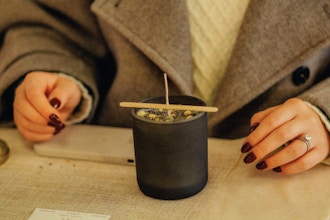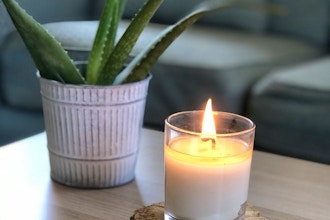Discover the Best Soap Making Classes in Seattle
Soap is such a staple in everyday use that you might not think about what makes it lather and clean so well. People have been making soap for thousands of years, and the same basic formula is used today. When you combine oils or fats with an alkali, such as sodium hydroxide, it results in a chemical reaction called saponification.
According to an ancient Roman legend, rain washed down the flanks of Mount Sapo – soap’s namesake – and mixed with animal fat and ashes to produce a clay mixture that made cleaning easier. A clay tablet from ancient Babylon describes using fats and ashes for cleaning as early as 2800 BC. A 1500 BC Egyptian medical document called the Ebers papyrus describes combining animal and vegetable oils with alkaline salts to form a soap, which was used for treating skin diseases and washing.
Soap attaches to particles that don’t dissolve in water, like fats, so they rinse away. When you wash your hands with soap it removes the pathogens that are carried in grease and dirt. Dirty, greasy dishes that feel oily after a rinse in water are squeaky clean after a soapy wash. You’ve probably seen artful baskets of handmade soap at markets and boutiques, so pretty they look like edible confections. There is magic in the chemical reaction that produces soap, but it’s simple enough for anyone to make at home.
Why You Should Learn Soap Making in Seattle
Many people love handmade soap, crafted in small batches using natural, skin-loving products. When you create handmade soap you have full control over the formula – select nourishing oils and butters, choose your favorite scent, and express your creativity with colors and textures. You can mold your soap into unique shapes or make one-of-a-kind rustic bars.
The culture in Seattle is primed for a unique and nourishing product like handmade soap. The community is health-conscious and environmentally aware, and many residents prize natural, organic, and sustainable options. The city has a culture of supporting artisans at over 70 farmer's markets, plus craft fairs and boutiques where soap makers can sell their products. The famed Pike Place Market has operated as a thriving public market since 1907.
Seattle is also a popular tourist destination, attracting 34 million visitors annually from around the world who spend over $7 billion. Handmade soap can appeal to tourists who are looking for unique and locally crafted items that represent the character and spirit of the city. Washington is known for its abundant farms and natural resources; soap makers in Seattle can take advantage of locally produced ingredients like botanicals, essential oils, and herbs. You can visit a piece of soap history at the Log House Museum on Alki Beach. The cabin was built by the founders of Seattle’s first soap company, Seattle Soap Co., which operated as far back as 1896 and made Emerald, Blancho, and Sopo soap brands.
Soapmaking is a growing industry globally, valued at $147 million in 2021 and expected to reach $228 million by 2028. The average annual income for handmade soap makers is $28k. There are over 300,000 soap-making businesses in the U.S., and the online marketplace Etsy features over 162,000 listings for handmade soap.
Making soap is a fun hobby and a great stress reliever, and you can bathe in the delightful product that you create. Explore classes, craft stores, and local markets to connect with other soap makers who share your new passion.
In-Person Soap Making Classes in Seattle
Candle Making Workshop at The Knowledge Academy in Seattle, Washington will give you an understanding of candle making. You’ll learn about container types, wicks, waxes, and fragrances. The Knowledge Academy offers professional training solutions to agencies, organizations, and individuals around the world.
Introduction to Candle Making at The Handmade Academy will teach you the basic skills of working with soy-based wax, beeswax, and pure essential oils. You’ll learn safety considerations, review necessary equipment, learn about different types of wicks, and learn how to color and scent your candles. You’ll complete soy wax votives, soy wax container candles, and beeswax-rolled tapered candles. The Handmade Academy specializes in teaching students the art of creating natural soaps, bath & body products (such as lotions, creams, lip balms, and scrubs), and other crafts in a fun environment that encourages creativity and discovery.
In Workshop: Spoon Carving you’ll learn the craft of creating an elegant wooden spoon using intuitive methods. This course is designed for both beginner and intermediate-level students. It covers how to select wood, design a spoon, and use a combination of hand & power tools to carve an heirloom-quality kitchen spoon that you will cherish for years to come. Pratt Fine Arts Center provides a place for absolute beginners and established artists to work side-by-side. Affordable studios with unparalleled equipment offer artists of all ages, abilities, and backgrounds the opportunity to learn, experiment, and create.
The Art of Pressed Flowers for the Holidays at UW Botanic Gardens in Seattle, Washington explores the world of pressed plants and flowers. You’ll take a tour of the Hyde Herbarium and learn how to select plants for pressing, the pressing and drying process, and how to mount a herbarium specimen. You will also be able to choose and mount a specimen of your own, complete with an official herbarium label. Pressed plants make wonderful cards, so you will also have the chance to create holiday notecards to give away or keep. UW Botanic Gardens is a unit within the University of Washington School of Environmental & Forest Sciences. Their mission is sustaining managed and natural ecosystems and the human spirit through plant research, display, and education.
Virtual Soap Making Classes
If you can’t find the soap-making class you’re looking for in Seattle, explore these online soap making classes. Taking a class from home is simple, and it saves you the time and stress of a commute. Make sure you have a web-enabled device with a microphone and a quiet space where you can attend class undisturbed.










